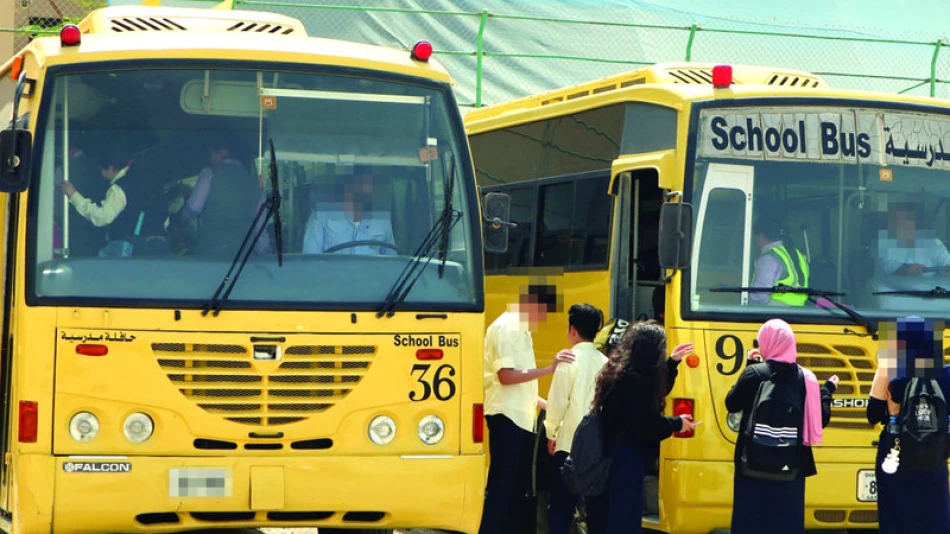
Navigating Challenges: Private School Buses Face Obstacles, Leaving Parents Seeking Unsecure Alternatives
UAE Private Schools Face Transport Crisis as Parents Abandon Unsafe, Overpriced Bus Services
Private school transportation in the UAE is reaching a breaking point, with parents increasingly abandoning official bus services due to exorbitant fees, overcrowding, and safety concerns. As costs soar to AED 8,000 annually—sometimes exceeding tuition fees themselves—families are turning to ride-sharing apps, electric scooters, and even relocating homes to avoid a system plagued by poor supervision and lengthy commutes that can consume up to three hours of a child's day.
The Economics of Educational Transport
The financial burden of school transportation has become unsustainable for many UAE families. Parents report bus fees ranging from AED 4,000 to AED 8,000 per year, with some schools charging more for transportation than for education itself. In one striking example, schools with AED 10,000 annual tuition fees demand AED 6,000 for bus services—a 60% surcharge that defies basic market logic.
This pricing structure reveals a fundamental disconnect between service quality and cost. Unlike transportation systems in Singapore or parts of the United States, where school bus fees are typically subsidized or regulated, UAE private schools operate with minimal price oversight, creating what economists would recognize as a classic market failure.
The Hidden Costs of "Affordable" Education
The situation becomes particularly acute for budget-conscious schools targeting middle-income families. These institutions often advertise low tuition fees but compensate through inflated transportation charges, effectively practicing a form of price discrimination that hits families hardest when they've already committed to enrollment.
Safety Concerns Drive Parent Exodus
Beyond financial pressures, safety issues are compelling parents to seek alternatives. The most serious concern involves age-mixing on buses, where teenagers and elementary students share confined spaces for extended periods. This creates environments ripe for bullying and intimidation, with younger children becoming targets of verbal and sometimes physical abuse.
Parents describe scenarios where three children squeeze into two seats due to overcrowding—a practice that would violate safety regulations in most developed countries. The lack of adequate supervision compounds these problems, with undertrained monitors unable to manage diverse age groups effectively.
The Psychology of Commute Stress
Extended journey times—often exceeding two hours daily—are creating additional developmental concerns. Children wake at 5:30 AM and return home at 4:00 PM, exhausted and with minimal time for homework or family interaction. This mirrors urban planning failures seen in sprawling cities worldwide, where transportation inefficiencies undermine educational outcomes.
The Rise of Alternative Transport Networks
Frustrated parents are pioneering creative solutions that reveal both resourcefulness and systemic failure. Ride-sharing services have emerged as the primary alternative, offering journey times 50% shorter than official buses. Parents coordinate through WhatsApp groups to establish carpooling rotations, while older students increasingly use electric scooters or public transportation where available.
Some families are making dramatic lifestyle changes, relocating closer to schools to eliminate transportation needs entirely—a phenomenon that mirrors gentrification patterns around high-performing schools in cities like London or New York.
The Regulatory Response Gap
These informal networks operate in a regulatory gray area. The Abu Dhabi Department of Education and Knowledge explicitly disclaims responsibility for non-official transportation, creating potential liability gaps that could prove problematic in emergency situations.
Government Intervention on the Horizon
Recognizing the crisis, Abu Dhabi authorities are implementing comprehensive reforms for the 2025-2026 academic year. New policies will mandate full school responsibility for transportation safety, regardless of whether services are outsourced, and establish integrated pricing frameworks subject to government approval.
The reforms include standardized satisfaction metrics across eight categories and mandatory compliance with safety protocols developed by the Abu Dhabi Quality and Conformity Council. Most significantly, journey times will be capped at limits set by the Integrated Transport Centre, potentially addressing the lengthy commute problem.
Learning from Global Best Practices
These changes align UAE practices more closely with international standards. Countries like Canada and Australia have long required schools to maintain full accountability for transportation services, even when contracted to third parties. The integration of pricing oversight mirrors regulatory approaches in European markets, where education-related services face consumer protection scrutiny.
Market Implications and Future Outlook
The transportation crisis reflects broader challenges in UAE private education, where rapid expansion has outpaced regulatory frameworks. Schools that fail to adapt to new requirements may face competitive disadvantages, particularly as parents become more sophisticated consumers of educational services.
For investors in the education sector, transportation quality is emerging as a key differentiator. Schools that proactively address safety and efficiency concerns may capture market share from competitors still operating under outdated models.
The shift toward alternative transportation also signals changing family dynamics in the UAE, with parents increasingly willing to invest time and creativity in solutions that prioritize child welfare over institutional convenience. This trend suggests a maturing education market where customer satisfaction will increasingly drive institutional success.
Most Viewed News

 Sara Khaled
Sara Khaled






